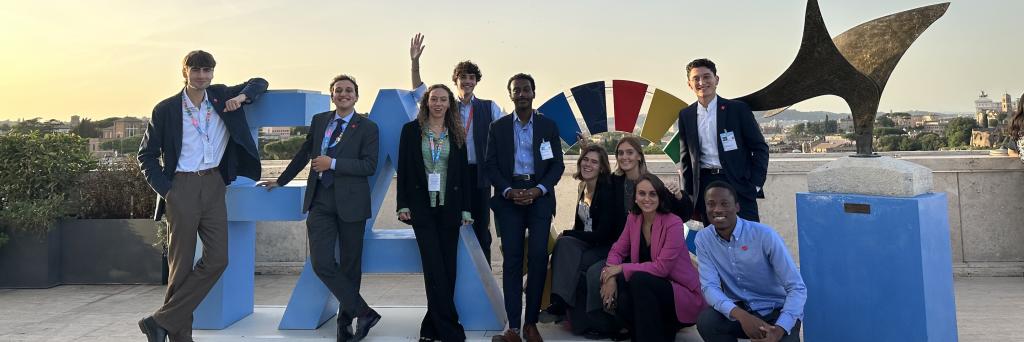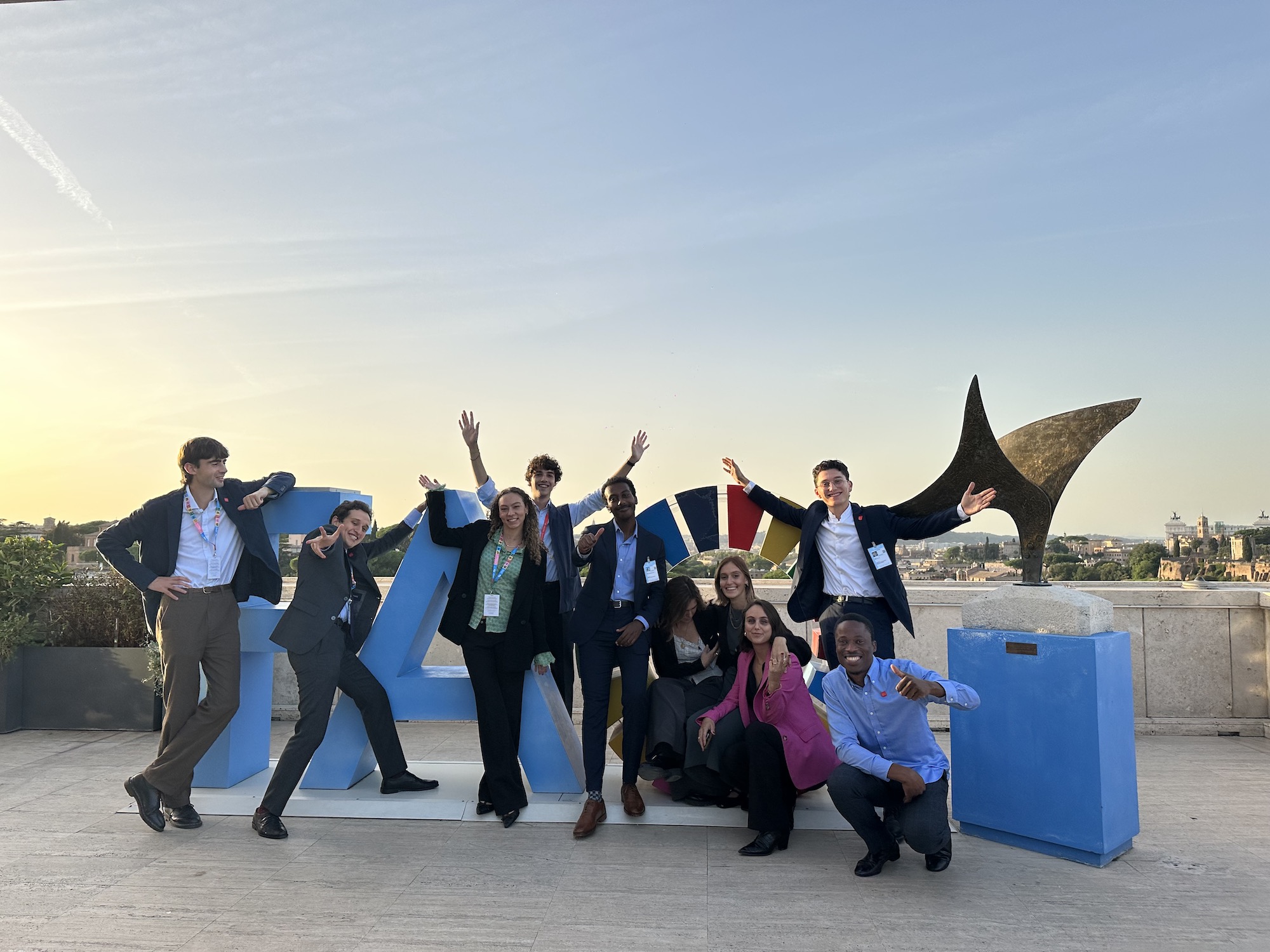You are part of the AgriFood Collective, a new student initiative at the Institute. How was it created and how did you come to present at the World Food Forum?
Antonia (Vice-president of the Collective):
The AgriFood Collective was born last semester, with a lot of determination—and yes, a fair bit of bureaucracy! Our goal was to create a space where students and professors could connect on food-related topics we’re passionate about. But we didn’t want to stop there. We envisioned the Collective as a bridge not only within academia but also to the world outside—linking with farmers, local coalitions, international organisations and NGOs.
When Giulia and Gustave suggested organizing a side event at the World Food Forum (WFF), it felt like the perfect opportunity to launch the Collective. We were aiming high, and although the Collective was still in its early stages, it was amazing how many people were eager to jump on board. This experience has been invaluable, showcasing the Collective’s mission and proving what passionate students can achieve together.
Gustave (Co-president of the Collective):
Attending the WFF was a really special experience. We connected with practitioners, indigenous youth leaders, diplomats, and farmers. Engaging at the forum in Rome really embodies the philosophy of our collective: going beyond the classroom and empowering youth voices for social change. At the heart of the collective is the idea that food is not just food, and that changing the food-system is changing society.
We’re proud that the collective created this opportunity and opened it up to fellow students. This semester, we welcomed new members in the collective, increasing our core team from 4 to 12 people. We have many upcoming projects, including a high-level panel discussion on agroecology - stay tuned!
Giulia (Co-president of the Collective):
Our “flagship” moment of the forum was our very own side event! Aligned with the collective's values, we aimed to make it a genuinely interactive experience, empowering participants to take charge of their knowledge creation. The feedback on the workshop was overwhelmingly positive: participants were engaged, discussions were rich, and the insights shared were truly inspiring. The response far exceeded our expectations, making the experience deeply rewarding for all of us!
Setting up the AgriFood Collective while organising our team’s participation at the WFF was challenging, with so much happening at once,but it was also an incredible learning experience. We were the first team from the Geneva Graduate Institute to participate in the WFF, and we are committed to keeping this momentum going. Through our collective, we will make this a recurring, annual initiative, like delegations from other Swiss universities have been doing for years.
Please tell us about your presentation on “Empowering Communities: Practical Models for Transforming Agri-Food Systems”. What inspired you to work on this topic?
Our presentation reflected our commitment for transforming agri-food systems in ways that genuinely empower communities, showcasing practical models with real-world impact. Each of the four models presented draws from personal experiences. Alessandro and Gustave presented findings from their Applied Research Projects (ARP), which they conducted during their first year of the master’s programme. Giulia shared insights on community food sovereignty inspired by a project she participated in Guatemala. Lastly, Aristide showcased the transformative power of social finance.
Alessandro: Through my ARP, I had the opportunity to collaborate with FAO on the humanitarian-development-peace nexus and its potential to address acute food insecurity in the Democratic Republic of the Congo. After a year of hard effort, the opportunity to present our meaningful work with my teammates Loïc and Marcus, and contribute to an important event like the WFF, was truly rewarding. Being able to share my knowledge of such a crucial topic for today's multifaceted challenges was incredible, but witnessing how people engaged with and implemented the concept during the case study exercise was even more motivating.
Giulia: Two years ago, I had the opportunity to work closely with an indigenous cooperative in Guatemala through a collaboration with an Italian NGO. The project aims at the achievement of food security in their region through food sovereignty and community empowerment. This experience was incredibly eye-opening; I learned so much from the cooperative’s work in their village and the surrounding communities. When we decided to explore community empowerment in our side event, I knew I had to share this project. I was also able to collaborate with Miguel, the project coordinator I worked with in Guatemala, who joined us virtually to provide insights into their work first hand. It was meaningful to bring their voices into the conversation and offer a real-life example of food sovereignty in action. I believe his insights and his presence as a young leader at a youth conference made the presentation all the more impactful and special.
Gustave: I had the chance to present the tool ‘Farmer-Field-School’ - defined as spaces which redesign knowledge production as a horizontal co-creation between farmers, scientists and policymakers. Farmer-Field-Schools have been recognised for empowering farmers and for scaling-up sustainable practices such as agroecology. I had the opportunity to learn and develop expertise on this model through my ARP, for which I conducted 3-weeks field research in Cameroon with our amazing ARP team - Hannah, Marta, and Valentina. During our side-event, it was incredible to see how the audience applied the tool on the case study.
Similar to the philosophy of Farmer-Field-Schools, we managed in our side-event to create a participatory and interactive space where the audience - rather than being merely recipients of knowledge, could engage, co-create as well as bring in prior knowledge.
We were honoured to host 80 participants in our workshop, even though the room was designed for 60… everyone there had unique backgrounds and skills to bring to the table - but all shared the strong will to have a positive impact and transform the agrifood system!
Aristide: I highlighted the empowerment potential of social finance through the Women’s Fund for Climate Resilient Agriculture, which I manage at Climate Relief. Smallholder farmers are often viewed as high-risk clients by microfinance institutions, limiting their access to agricultural credit. In Benin, women face heightened financial barriers, as they lack land ownership often required as loan collateral. The fund addresses this by offering interest-free loans, enabling women to adopt climate-smart agriculture and drive transformative change.
Antonia and Matteo, you developed a case study on the topic — please tell us about it.
Antonia: We structured our side event to unfold in two parts. First, four of our colleagues introduced key models they’d researched, laying out potential tools for addressing complex food security issues. Then came the second part—a hands-on workshop designed to bring these models to life. To make this happen, we created a fictional case study set in a region we called ‘Hiedia’ – does it sound familiar?
Hiedia, marked by colonial legacies, faces challenges that can undermine any food system, with limited land control and a history of forced shift to sugar-based exports. Border conflicts over scarce water resources have triggered a humanitarian crisis, while decades of intensive monoculture farming have degraded the land and erased traditional agricultural knowledge. Climate change now looms, threatening farmers livelihoods, particularly for women who lack access to financial resources for climate-resilient solutions.
Matteo and I crafted a scenario that highlighted key elements of the models being presented, and with feedback from the team, we developed clear instructions to guide group discussions, sparking meaningful conversations as participants selected two out of four models to address Hiedia’s challenges.
This experience truly honed our teamwork skills, especially since collaborating with friends isn’t always easy. But we managed, and I’d say it was a success. Seeing 60 participants engage with a case study we had built from the ground up was incredibly rewarding!
For the other students, how did you get your project to the World Food Forum?
Loïc (moderator): Preparing such a side event evidenced two key elements in terms of planification and realisation. On the one hand we ought to prepare everything perfectly. From the different phases to “plan-Bs” in the event of external shocks, we attempted to keep everything under control. On the other hand, and thankfully we were ready for this, keeping everything under control is not always possible and real life situations force you to stay flexible and to manage these non-controllable shocks on the spot. For our side event and to give only one example, this included a sudden notice regarding FAO’s paperless policy we were not aware about, while we had prepared paper-fiches to provide visual support to the participants during our fictional case study. The answer to this was to quickly create a QR code the participants could scan to get a virtual version of our fiches on their phones.
Hence, in addition to the incredible experience of participating in such a forum, important takeaways consist of this dual organisation-flexibility skill, since we all worked together to organise our side event in the best manner possible, while we also were all affected by external and non-controllable shocks forcing us to stay flexible to enable the side event to be delivered in the best possible way. What an experience!
Marta (logistic team): Participating in the creation of the side event was a rewarding experience that offered a unique opportunity to feel heard and that youth voices and academia matters in the global food discourse for FAO. Seeing so many peers that were interested and passionate like us on similar topics felt reassuring towards the future . As part of the logistics team, I was responsible for managing a range of behind-the-scenes tasks, from coordinating schedules and resources to ensuring that all event components aligned smoothly. This role allowed me to refine my organisational skills significantly, as I learned to anticipate potential challenges and respond to them. Additionally, working closely to create an event from scratch with a team reinforces the critical role that collaboration plays in successful project management.



